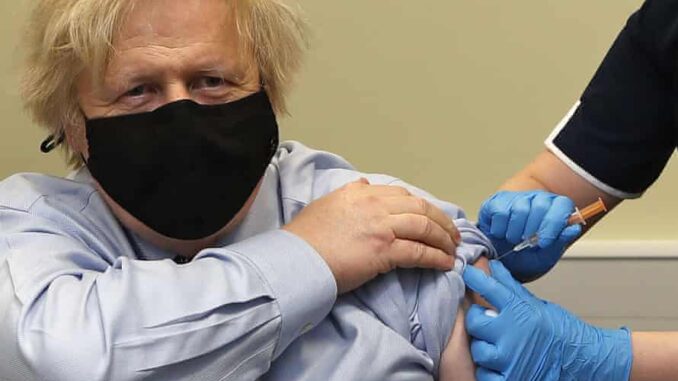
Covid vaccines may be far less effective at preventing infection than previously thought according to Professor Karl Friston of University College London.
Analysis by Friston, a leading modeller, suggests the vaccines are, however, very good at stopping severe illness, death and transmission of the virus to others. He says while infection is ‘surprisingly common’ among people who have been jabbed, symptoms are often extremely mild or non-existent.

BYPASS THE CENSORS
Sign up to get unfiltered news delivered straight to your inbox.
You can unsubscribe any time. By subscribing you agree to our Terms of Use
Latest Video
MSN reports: But there are still plenty of cases where symptoms are stronger and it is unclear how many of these go on to develop long Covid.
As a result, even people who have had two jabs should behave more or less as they did before they had their vaccinations if they want to be safe, according to Professor Karl Friston, of University College London, whose modelling is based on “real world” data.
His analysis suggests that the “effective efficacy” of the jab at preventing infection at the moment is just 2.9 per cent – meaning people who have had at least one jab are, on average, 2.9 per cent less likely to become infected than unvaccinated people.
This is largely because people have “let their guards down” by dramatically reducing social distancing and other safety measures, thereby putting themselves at much higher risk, he believes.
It also seems that the vaccine is much less effective at preventing infection than had previously been thought, said Prof Friston, who publishes a weekly Covid-modelling report and sits on the influential independent Scientific Advisory Group for Emergencies (Sage).
He began to question the “real world” effect of the vaccine after new cases started to soar by far more than would be expected given the rate of vaccination.
Although the Delta variant is much more contagious than previous forms of Covid, that wasn’t enough to explain the increase.
“I was surprised because up until about a month ago we had assumed the vaccination just stopped infections and yet that assumption made it absolutely impossible to explain the notification rates [new daily tests] and symptoms,” Prof Friston told i.
He says the low effective efficacy of the jabs against infection is only a hypothesis but he believes there is no other explanation for why cases are soaring.
“The only way you could explain the resurgence of new cases was to relax the assumption that people who were vaccinated couldn’t get infected. There was a missing link and when we relaxed that assumption suddenly everything started to fit,” he said, referring to the trend of Covid rates rising far faster than deaths and hospital admissions.
“So it may be wise to consider yourself at the same risk of contracting coronavirus when doubly vaccinated as prior to vaccination – even though you are less likely to be hospitalised or die,” Prof Friston added.
Previous estimates of vaccine efficacy against infection have suggested it is 55 to 70 per cent effective at preventing infection – and even more effective at protecting people against serious illness and death.
But those were calculated in trials where vaccinated and unvaccinated people behaved the same because as they didn’t know if they had the real vaccine or the placebo.
In the real world – measured by “effective efficacy” – the difference between how many vaccinated and unvaccinated people get infected shrinks because those who have been jabbed are likely to take more risks.
“It may well be that the vaccination is actually preventing you becoming infected by about 60 per cent but that is undone by the fact that you’re letting your guard down and you’re socialising more,” he continued.
“So the effective efficacy accommodates all these extra factors. That kind off efficacy can only calculated based upon real world data.”
Prof Friston and University College London colleague Professor Anthony Costello have set out their hypothesis in a comment piece for the British Medical Journal (BMA).


